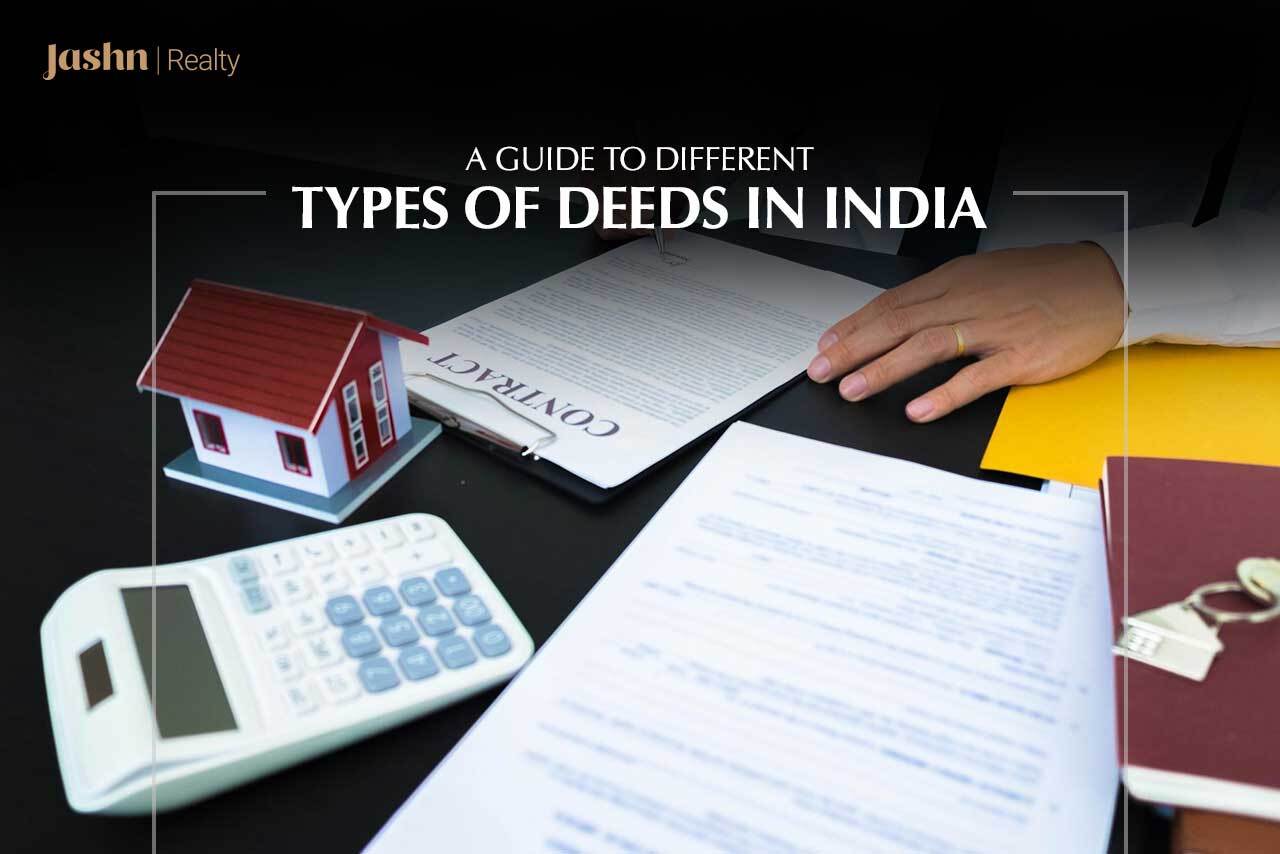What are deeds? If that question comes to mind, let us simplify it for you. There are different types of deeds in India. Deeds are legal documents that certify ownership of a property. In real estate, these documents hold significant importance, as they confirm transactions between a buyer and seller.
The most popular deeds in India are Sale Deed, Will Deed, Power of Attorney Deed, and so on. Every deed is meant for a specific purpose. Here, in this blog we will discuss different types of deeds and their purposes in real estate.
Important types of deeds in India
Sale Deed
This deed is essential during a property purchase between a seller and a buyer. The seller transfers the title, ownership, and other rights using this deed.
In other words, in a real estate transaction, the sale deed is signed by buyer and seller mutually.
Who keeps the sale deed?
If you have bought a property without borrowing from any bank or financial institution, then you keep the sale deed. However, if the bank is involved, then the bank will keep the sale deed as a proof of your ownership until you pay back the borrowed amount.
Lease Deed
A lease deed is executed between a property owner and the lessee or a tenant. The purpose of a lease deed is to grant permission to the lessee to occupy the property for a specified tenure upon making an agreed payment.
Who keeps the lease deed?
Both the parties keep the lease deed. While the owner holds the original deed, the lessee gets a copy of the lease deed.
Mortgage Deed
A mortgage deed is signed between a lender and borrower. This document features all the information regarding a loan. It includes:
- Details of the parties involved
- Borrowed loan amount
- Rate of interest and more
With the help of this document, one can easily determine the owner of the mortgaged property.
Who keeps the mortgage deed?
The mortgagee or lender keeps the mortgage deed as a security to the loan until repayment.
Gift Deed
A gift deed is a legal document that documents property transfer as a gift to the other person without any financial transaction. A gift deed can be executed for both moveable and immovable properties. It comes under the Transfer of Property Act 1822 in Section 122.
Who keeps the gift deed?
The donee keeps the original copy as being a new owner. The donor can keep a copy of the deed as a proof of transfer.
Conveyance Deed
This legal document confirms the transfer of a property from the seller to the buyer or the grantor to the grantee. The document includes the terms of transfer, payment, property description, and any other covenants related to the property.
In real estate transactions, a conveyance deed is important to prove ownership and protect the ownership rights.
Who keeps the conveyance deed?
The buyer keeps the conveyance deed as a proof of ownership.
General Warranty Deed
General warranty deeds are legally binding documents executed during real estate transactions. This deed’s purpose is to assure that the property doesn’t have any liabilities or obligations. The grantor pledges that the property’s title is clear.
Who keeps the general warranty deed?
The buyer or the grantee keeps the general warranty deed.
Special Warranty Deed
As compared to a general warranty deed, the special warranty deed offers limited guarantee from the grantor. While the general warranty protects the buyer by confirming that the property is clear, a special warranty deed ensures that no encumbrance or title flaws were made during the ownership.
Who keeps the special warranty deed?
In this case, too, the buyer keeps the original special warranty deed.
Adoption Deed
As the name implies, adoption deed is executed to formalise the adoption process between non-biological parents. Through this deed, the adoptive family provides responsibilities and rights to the adopted kid just like their own heir or biological child.
The document also bestows the biological parents’ rights and responsibilities to the adoptive parents. Under the Hindu Adoptions and Maintenance Act, 1956 all the regulations are mentioned.
Who keeps the adoption deed?
The adoptive parents, the governing court, or an adoption-agency can keep the adoption deed.
Fiduciary Deed
Fiduciary means trustee or a person who holds legal trust of a group or parties. This deed is executed to clarify that the trustee is working per the law and within the jurisdiction. The deed can be used in property transfers in scenarios where the owner cannot sign a deed due to legal obligations.
Who keeps the fiduciary deed?
The fiduciary deed is kept by the trustee.
Court Order Deeds
A court order deed is a legally binding document for property transfers without the consent of the owner. The court order deeds are executed in those scenarios in which the owner is deceased or cannot pay. The property sale is authorised by the court.
Who keeps the court order deed?
The winning party keeps the court order deed.
Will Deed
This legal document is executed on the behalf of an individual who wishes how his/her property or assets should be given equally to heirs after their demise. The testator also appoints an executor to ensure the assets are divided equally as per the Will’s provisions. It also includes donations to charity and custody of minors if any.
Who keeps the Will deed?
The executor appointed by the testator keeps the Will Deed. If the testator is alive, they can keep it themselves, too.
Grant Deed
This deed formalises the exchange of a pre-agreed sum of money in real estate. it also clarifies that the property is free of any obligations or debts and the seller has the full ownership.
Who keeps the grant deed?
The buyer keeps the grant deed.
Power of Attorney Deed
It is a legal document that grants a person (appointed by the owner of property or wealth) act on his/her behalf. A Power of Attorney can grant specific or broad rights, spanning various aspects such as real estate, business, and wealth.
Who keeps the POA (Power of Attorney)?
The person acting on the behalf of original owner (grantor) keeps the POA. The person granting the authority can also keep a copy to provide it to other concerned parties.







